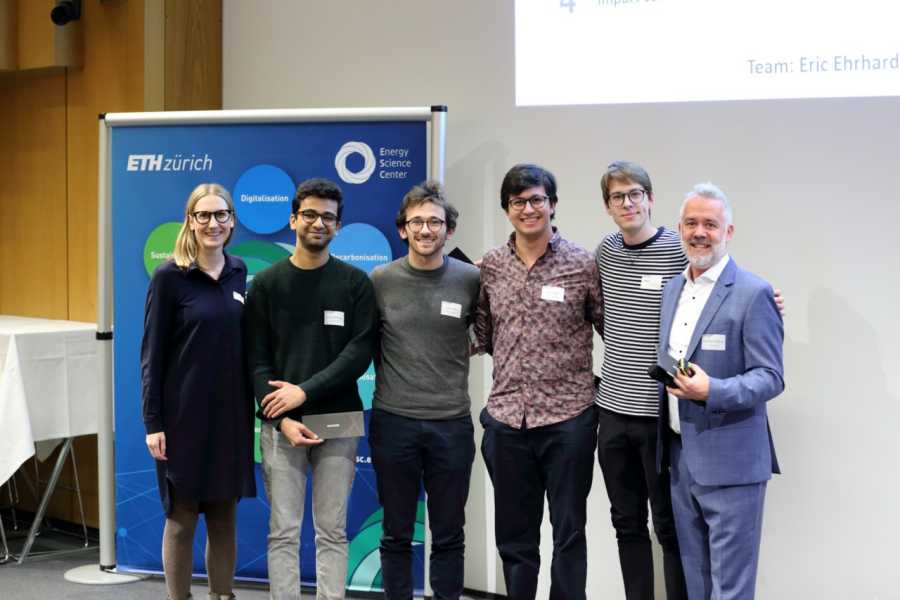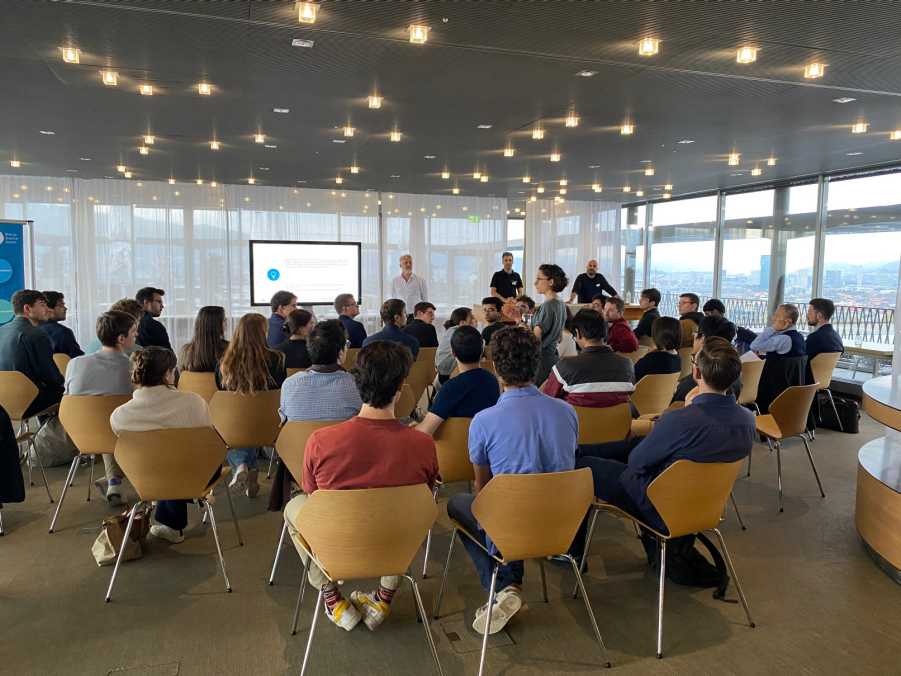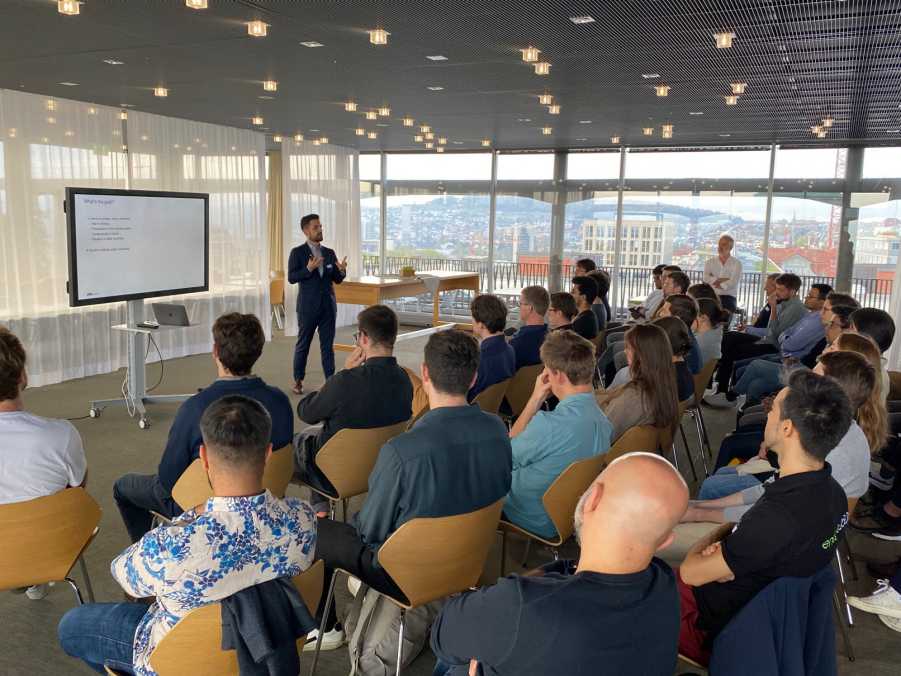Energy Now! 2022

In 2022, Switzerland, like many other European countries, faced the threat of a winter energy shortage – both of natural gas and electricity. In view of this possible shortage, the Federal Government called upon public and private actors to conserve natural gas and electricity and launched a campaign to this effect.
The goal of "Energy Now!" was to come up with intelligent, science-based solutions to support private and public actors in Zürich to avoid these potential electricity and natural gas shortages in the City and Canton of Zurich. Solutions could also include measures inside of ETH Zurich and could eventually be applied on a larger scale outside of Zurich, thereby using the city and canton as a lab for a Swiss-wide or a European-wide application. Participants proposed and worked on their solutions over a short time frame to address this imminent issue.
You can watch a short SRF news feature about 2022's challenge external page here (1:42 onwards).
Congratulations!
Congratulation to the winning team of Energy Now! 2022: Eric Ehehardt, Daniel Biek, Arijit Upadhyay and Carlo Tajoli. Together, they addressed the challenge of visualizing consumption data.
First edition's challenges
Check out a list of challenges proposed for the Energy Now! 2022 below. Stay tuned for this year's challenges!
Each person can help to save energy, but how depends strongly on the individual way of living. A tool/chatbot asks for details about the housing situation (number of people in household, apartment/house, heating source, square meters etc.) and maybe other aspects of life and gives personal advice about energy savings: what are biggest consumers, where is biggest potential to save energy, how much energy can be saved etc.
How to create Awareness As a country, we want to save energy. What are the most effective ways to create awareness and motivate people to act? What can the past and research tell us about effective and ineffective methods? How much would the potential savings of these methods be and in which scenarios would that be enough to avoid a supply gap?
Forecast with Scenarios As a citizen or politician, I would like to get a feeling for the dependencies between factors like precipitation, number of French power plants under revision etc. and a potential supply gap. This could be a scenario analysis or an interactive dashboard in which factors can be changed by hand
Behavior of the population in case of an electricity interruption: distribution of the load in the time outside the interruption (EV charging, laundry,…)? How can the simultaneity factor be reduced during these times? Automatic loads (fridge, cooling systems, heatpumps,…): which is their load and operation outside the interruptions? how much energy can be effectively saved by the cyclical interruptions (taking into account e.g. shiftable loads, efficiency reduction in refrigerators, loads that are automatically switched on again, etc.)?
The measures to reduce gas consumption are well known. The Federal Council outlined its plans in two draft ordinances at the end of August and sent them out for consultation. For example, in the event of a gas shortage, swimming pools or saunas may no longer be heated if they are connected to the gas grid. The same applies to parts of buildings that are not used on a daily basis, such as holiday homes.
The regulation that gas may no longer be used for heating above 19 degrees has caused a particular stir. In extreme cases, energy offenders who disregard this rule could even face prison sentences. At least, that is what the National Supply Act stipulates. However, it is up to the cantons to monitor compliance with the regulations, the Federal Council stated at the end of August.
The canton of Zurich is demanding that the Federal Council restrict not only the use of gas, but also electricity at the same time. Swisspower, an association of municipal and regional energy suppliers, takes a similar view. The supply situations for gas and electricity are closely linked. If there is a shortage of gas, there is a risk that electricity will also run out, says Swisspower.
Make operational optimization well known and popular Operational optimization (Betriebsoptimierung (BO)) is a practice that helps to save energy used in running office buildings, workshops, factories etc. According to experts, companies can quickly save 10-15% of their energy expenditure by performing a BO project and implement a few often simple and cheap measures or adaptations. However, many companies - especially small and medium-sized companies (KMU) - don't know about BO or have not yet used it - even though many actors offer consultation or even access to subsidies for performing a BO. How can KMU and companies in general be convinced to perform a BO as soon as possible and thus save energy in their operations?
Are Digitalization, Energy and Smarter Building as secrets ingredients for any recipes to face this Upcoming Winter and a sustainable way of living?
Data is Gold, Smart building generate a lot of it, even more when combine with data's from more oncoming energy monitoring devices and digitalization of energy system. Challenge: How could we optimize Building and Campus energy consumption by learning from their user’s habits and using smart monitoring energy devices?
Energy prices are currently very high, and many citizens, especially the socially weaker, as well as companies, especially manufacturing industries, are demanding the intervention from the federal government/canton. Some political and economic actors demand a reduction of wholesale prices or a price cap for electricity. Furthermore, the federal government is calling on citizens and companies to make voluntary savings. The cause of the sharp rise in prices is an imbalance between supply and demand. Since supply cannot be increased quickly enough, demand must be reduced. A discount or a price cap on energy purchases has a counterproductive effect in this respect, as there are no incentives for voluntary saving. Reducing energy consumption and lowering the associated energy costs presents a dual challenge. How can we solve the dual challenge by introducing new tariffs on our electricity bills?
So far, the proposed measures from the state and the cantons have focused on lighting and heating. A third major energy sink has so far received little attention: the food sector. Not only is this a fundamental resource for which we need to guarantee availability, but also one that has great potential for energy savings -- some of which are flexible, and some of which may be simply inevitable. For instance, the question of whether I prepare a cold or hot meal, or whether I use the oven or the stove, is a flexible area. However, if we are confronted with frequent half-day outages, it is no longer a question of whether I use my refrigerator or not; this is an inflexible area. A lack of refrigeration alternatives incurs a high amount of food waste, causing even more energy consumption. While some non-cooling conservation techniques (using salt or sugar) are widely known, many such techniques that were used centuries ago have drifted into oblivion (for instance, the conservation of root vegetables deep inside the soil with sand).


